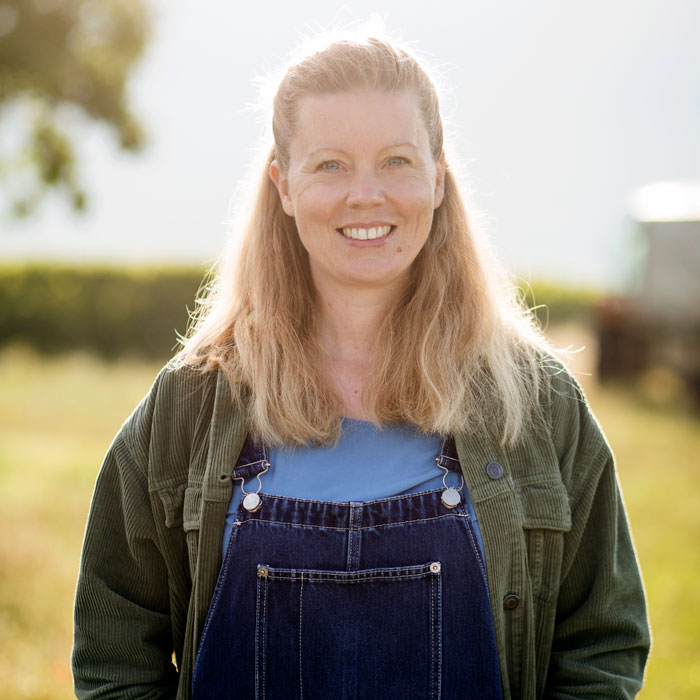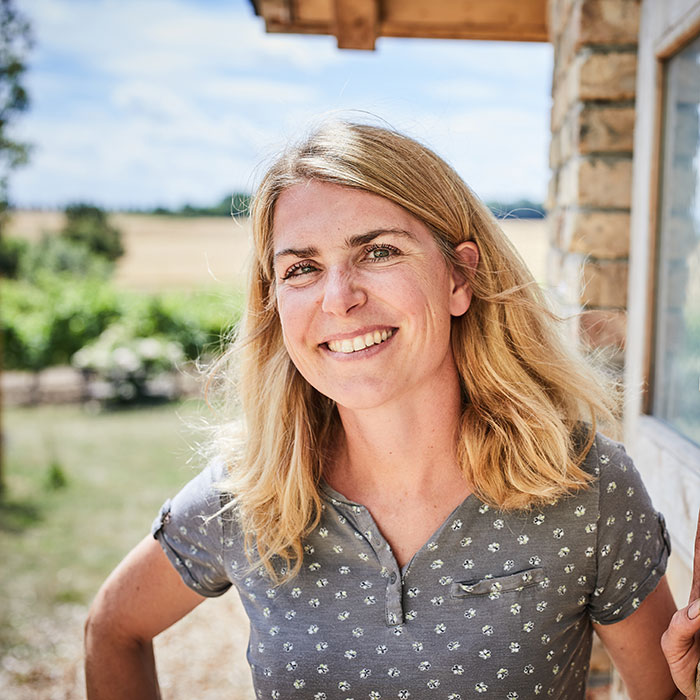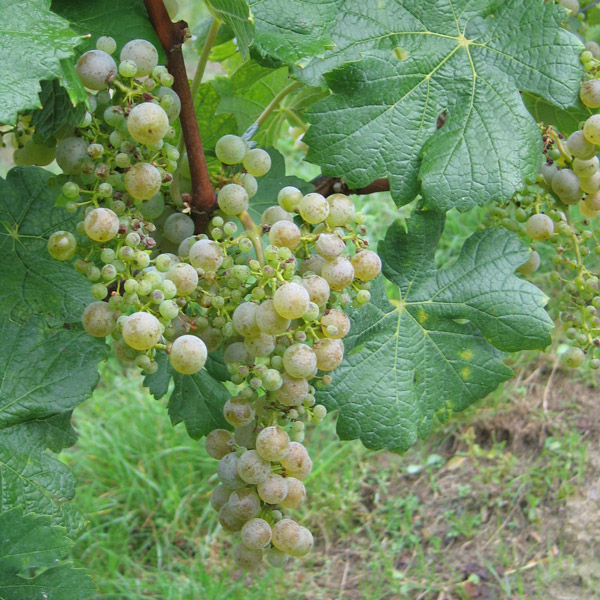Piwis have never been more popular than now. Why is the German wine scene nevertheless so little curious about them?
 Hanneke Schönhals
Hanneke SchönhalsSchönhals: The German wine industry is very fond of tradition. Germany is an absolutely varietal-oriented country. Not only in cultivation but also among consumers. Curiosity about new things is not exactly born into the industry. We have to bring that in first. The industry in Germany is predominantly shaped and represented by a smaller wine elite, which only makes up a small percentage. That's not a bad thing either, they set quality standards - but they define themselves primarily by Riesling and Pinot Noir. A young, wild concept without pigeonholes that still has to develop its style and wants to be discovered does not fit in with this. It does not immediately trigger enthusiasm. But I think that social change is helping consumers to become more aware of how a product is made.
Vollmer: The big problem from the beginning was the unfortunate choice of words. Piwi, meaning fungus-resistant grape varieties, is absolutely the wrong word for such a mission! The first thing people hear is the word fungus - and that immediately has negative connotations and is therefore counterproductive. That is why we can act in a completely different way with our "Future Wines" project.
For a very long time, piwis were only planted in the poor sites.
Why do winegrowers remain sceptical?
Schönhals: Planting a vineyard is a decision for the next 30 years. The decision in favour of traditional varieties gives the winegrowers security. After all, you have to be able to sell the wine.
Vollmer: To date, Piwis do not have the reputation they could have. To change that, we need lighthouse wines. However, there is little experience in this area - I haven't produced any myself yet. For a very long time, Piwi varieties were only planted in poor sites because they offer solutions there through frost and fungus resistance, while the good sites were occupied by Riesling and Pinot Noir. That's why it's difficult today to give clear expert tips. When I was interested in the Souvignier Gris variety, for example, it was very difficult to get hold of bottles of this variety. And what was available was not what I wanted. I still believed in the variety and planted it.
How long have you been involved with piwis? And why?
 Dr Eva Vollmer
Dr Eva VollmerSchönhals: My father planted the first piwis 30 years ago and switched to organic cultivation. At that time, he had the vision to completely get away from crop protection. When I joined the farm, we already had a share of almost 25 percent piwis, which was of course a super unique selling point. We tried everything: We used pictures and other names to put the varieties in the spotlight. But nobody was interested, except our private customers. But now the world is ready for such solutions. And then Eva came along with this new name...
Vollmer: When I studied in Geisenheim, the subject was not yet sexy. Not even for me. There was always the link: Piwi equals Regent equals does not taste good. This sensory threshold was there for a long time, also because there was hardly any liquid evidence to the contrary. At that time, I first moved from conventional to organic in my head and in the winery. Only after this had been going on for a year or two did I have the head space to take what for me was the most important step of my generation, to turn the tide in the direction of sustainability.
What are the plans for the future?
Schönhals: We see ourselves as pioneers who don't just make simple wine, but profound wine. We have both decided to plant only Piwis and to take the risk of planting the new varieties in good and best sites.
What is the significance of organic and sustainability in this context?
Schönhals: That is a very difficult topic. I myself come from organic viticulture and I am convinced that we no longer need to discuss golf lawns in the vineyard and the spraying of glyphosate. Nor about the use of insecticides. But we cannot rest on our laurels in organic farming. The organic associations concentrate mainly on cultivation, and a lot has been missed out, especially with regard to social aspects. That is why the emergence of labels like "FairChoice" and "fair'ngreen" is justified. Nevertheless, I am convinced that consistent organic cultivation is the basis on which we should build with all further striving for sustainability.
Organic viticulture has nothing to do with planting piwis
What do you want to achieve with your "Future Wines" project?
Vollmer: We are heavily eco-loving, but we want to communicate clearly that organic viticulture has nothing to do with planting piwis. It is important to be able to reduce plant protection by up to 80 percent. This is because piwis save on pesticides every year - regardless of the type of organic or conventional cultivation. This is a good basis for slowly moving towards each other. We don't want to create barriers between organic and conventional - every farm is welcome to help shape our movement.
What is the response to the project so far? Are more winegrowers to be involved?
Vollmer: We have a vision far beyond Rheinhessen. We want to involve as many winegrowers as possible. And we need new perspectives on the subject: sustainability and marketing experts, sales people, fresh minds who look at the subject from new angles and who want to go into depth. A fancy look alone is not enough to uproot the old prejudices.
Schönhals: We ourselves are still practising having good arguments and talking about them. Here in Rheinhessen there is already a great diversity and open-mindedness for a variety of grape varieties. We want to carry this forward. Other countries are already much further ahead than we are; in Germany, Piwis are only three percent of the cultivated area. There is still enormous potential for growth.
We need more demanding vintages like 2021.
What is needed to convince more winegrowers and consumers of the new varieties?
Schönhals: Maybe we need more extremely demanding vintages like 2021. When you've hit the wall fifteen times - or gone through the vineyard to spray - it starts to hurt. This creates a will to change. But basically we have to make top wines.
Vollmer: The realisation in the minds of many winegrowers is already there. But they don't yet see the opportunity for good marketing. If we can show that this can be done well, it will awaken desires. We want to show the possibilities and ways to do this - and that can only be done by example. Everyone who is successful on their own stage has charisma. But that has to become stronger first.
Do Piwis have the potential for top wines?
Vollmer: There will and must be flagship wines, there will also be pure varietal top wines to let off steam. But if we think bigger, where is the greatest demand? It's not always about the fattest single vineyard, everyday life is about uncomplicated basic wines, and you can also serve them wonderfully with Piwis. This is a huge potential, also for the gastronomy. If, with good winemaking work, I can still put a top wine from a Piwi variety next to a top Sauvignon Blanc, all the better.
Schönhals: The discussion and the fear about Riesling are superfluous. With three per cent Piwis on the German cultivated area, we don't need to worry about preserving our top wines. Besides, Riesling in the best sites is now sometimes a risk because it becomes too ripe and too fat. It's all about the large carbon footprint in the base area, which we are reducing through piwis. What happens at the top is then wonderful to discover.
The VDP has to ask itself why Souvignier Gris is not allowed to be a local wine
Which Piwi varieties do you see ahead in the future?
 Cabernet Blanc - © Wikipedia - Wolfgang Renner
Cabernet Blanc - © Wikipedia - Wolfgang RennerSchönhals: We want to push certain grape varieties: Souvignier Gris, Cabertin and Satin Noir, Sauvignac, Cabernet Blanc. The latter is also very exciting as an orange wine! There is no other variety that would be better suited for this because it develops all the herbaceous potential in the berry skin. There are still so many discoveries possible, because we have not yet exhausted what can be made from these and many other varieties.
From whom would you like to see more support?
Schönhals: First of all, the new Minister of Agriculture, Cem Özdemir, could take up the issue and promote the planting of piwis.
Vollmer: It is a pity that our top association, the VDP, has been so little open so far. The sustainability discussion needs to be put more clearly on the table here, too. In the future, the VDP must seriously ask itself why a Souvignier Gris is not allowed to be a local wine.
What are the weaknesses of Piwis?
Vollmer: Many see the new varieties as a small shop whose range cannot be assessed. There's fear about the ripening time or the susceptibility to the cherry vinegar fly. But if you look at the wide range of varieties, you realise that there are plenty of alternatives. There are certainly two or three red Piwi varieties that are susceptible to the cherry vinegar fly. But if I want to make good rosé, they are still a great alternative. There is enough experience and advice to rule out such dangers.
Schönhals: The varieties are not one hundred percent resistant, but at least 50 to 80 percent. It is also said that they cannot compete in terms of taste. But we wouldn't plant them if we weren't one hundred per cent convinced.
Photos: © Hanneke Schönhals, Eva Vollmer